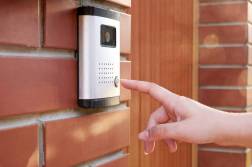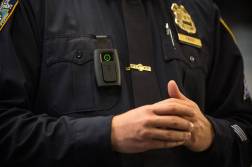Police body-worn camera study finds absence of ‘civilizing effect’

A recent study in Washington D.C. suggests that the use of body-worn cameras (BWC) by police officers may not have worthwhile effects on conduct between law enforcement and civilians.
The Lab @ DC — a newly established data science team operating out of District government — conducted this study following the US Department of Justice’s decision in 2015 to allocate more than $23 million in funding for BWC implementation across the country.
According to advocates for the technology, BWCs are expected to create a “civilizing effect,” which calms involved parties and reduces the chance of violence from both police and civilians. The study, however, suggests that this expectation is not being met.
For this study, the Lab @ DC collaborated with D.C.’s Metropolitan Police Department — one of the nation’s largest police forces, with approximately 3,800 sworn members serving more than 680,000 civilians in addition to daily commuters from surrounding states.
To assess the usefulness of BWCs, the Lab @ DC observed data between June 2015 and March 2017, focusing on four measures: police use of force, civilian complaints, policing activity, and judicial outcomes.
“We are unable to detect any statistically significant effects,” the study states. “As such, our experiment suggests that we should recalibrate our expectations of BWCs. Law enforcement agencies (particularly in contexts similar to Washington DC) that are considering adopting BWCs, should not expect dramatic reductions in use of force or complaints, or other large-scale shifts in police behavior, solely from the deployment of this technology.”
However, an annual report from Washington D.C.’s Police Complaints Board calls these results into question. According to the organization’s 2017 report, despite a mandate requiring all police officers to use BWCs, more than a third of the instances cited in misconduct complaints lack appropriate footage.
In these incidents, officers violated protocol for BWCs by turning the cameras on too late, turning the cameras off too early, positioning the cameras incorrectly, or failing to notify civilians that they were being recorded.
Other smaller studies also contradict the Lab @ DC’s findings. According to studies in California and Florida — and one international study — BWCs significantly reduced civilian complaints and police misconduct for these regions.
To explain this discrepancy, the Lab @ DC suggests it is possible that neither the civilians nor the police officers involved in certain scenarios were aware of the cameras and thus did not adjust their behavior. Or, both parties may have been aware of the cameras, but other factors escalated tensions, creating a distraction from the recording devices.
Another reason for these results may be attributed to training for law enforcement in Washington D.C. Because MPD has jurisdiction over the nation’s capital — where massive events like presidential inaugurations and large-scale protests take place — it is possible that the officers involved in this study were already adept at diffusing tense situations before they started wearing BWCs.
“The training officers undergo to operate in this high-stakes environment on a daily basis may equip them with a unique set of skills that translate into improvements in their interactions with District residents and visitors. In addition, over the two decades prior to the introduction of BWCs, MPD has undertaken several reforms to reduce police misconduct,” the study says.
The Lab @ DC also hypothesizes that the ordinariness of civilian smartphone footage may already have created a civilizing effect. Because pedestrian recordings of police interactions are so common, it is likely that both civilians and law enforcement officials already anticipate that someone may be watching them, researchers say.
Regardless of these possible explanations, the Lab @ DC still suggests that people should alter their expectations for BWCs and question if the technology is worth the cost.
“We would also temper expectations about (and suggest further research into) the evidentiary value of BWCs,” the reported states. “The administrative court data we had access to has certain limitations, but preliminary analyses do not uncover any clear benefits. Body-worn cameras may have great utility in specific policing scenarios, but we cannot conclude from this experiment that they can be expected to produce large, department-wide improvements in outcomes.”






